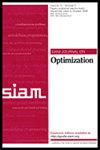分析伊辛-经典混合算法的共正框架
IF 2.3
1区 数学
Q1 MATHEMATICS, APPLIED
引用次数: 0
摘要
SIAM 优化期刊》,第 34 卷第 2 期,第 1455-1489 页,2024 年 6 月。 摘要。近年来,能够近似搜索伊辛自旋哈密顿的基态的量子/量子启发技术取得了重大进展。利用这些技术加速解决困难的优化问题的前景,激发了人们对探索将伊辛问题作为其解决过程一部分的方法的更大兴趣,现有方法包括直接转录和植根于现有优化算法的量子-古典混合方法。虽然人们普遍认为量子计算机应该增强经典计算机的功能,而不是完全取代经典计算机,但人们却很少关注量子计算机相互作用的分析特征。在本文中,我们以通过伊辛求解器求解混合二元二次方程程序(MBQP)为背景,对混合算法进行了正式分析。通过利用 MBQPs 现有的完全正重构以及新的强对偶结果,我们展示了共正矩阵锥上对偶问题的精确性,从而使由此产生的重构继承了凸优化的直接分析。我们建议用混合量子经典切面算法来解决这个重构问题。利用凸切割平面算法的现有复杂性结果,我们推导出这个混合框架的经典部分保证是多项式时间。这表明,当应用于 NP-困难问题时,求解的复杂性会转移到伊辛求解器处理的子程序上。本文章由计算机程序翻译,如有差异,请以英文原文为准。
A Copositive Framework for Analysis of Hybrid Ising-Classical Algorithms
SIAM Journal on Optimization, Volume 34, Issue 2, Page 1455-1489, June 2024.
Abstract. Recent years have seen significant advances in quantum/quantum-inspired technologies capable of approximately searching for the ground state of Ising spin Hamiltonians. The promise of leveraging such technologies to accelerate the solution of difficult optimization problems has spurred an increased interest in exploring methods to integrate Ising problems as part of their solution process, with existing approaches ranging from direct transcription to hybrid quantum-classical approaches rooted in existing optimization algorithms. While it is widely acknowledged that quantum computers should augment classical computers, rather than replace them entirely, comparatively little attention has been directed toward deriving analytical characterizations of their interactions. In this paper, we present a formal analysis of hybrid algorithms in the context of solving mixed-binary quadratic programs (MBQP) via Ising solvers. By leveraging an existing completely positive reformulation of MBQPs, as well as a new strong-duality result, we show the exactness of the dual problem over the cone of copositive matrices, thus allowing the resulting reformulation to inherit the straightforward analysis of convex optimization. We propose to solve this reformulation with a hybrid quantum-classical cutting-plane algorithm. Using existing complexity results for convex cutting-plane algorithms, we deduce that the classical portion of this hybrid framework is guaranteed to be polynomial time. This suggests that when applied to NP-hard problems, the complexity of the solution is shifted onto the subroutine handled by the Ising solver.
Abstract. Recent years have seen significant advances in quantum/quantum-inspired technologies capable of approximately searching for the ground state of Ising spin Hamiltonians. The promise of leveraging such technologies to accelerate the solution of difficult optimization problems has spurred an increased interest in exploring methods to integrate Ising problems as part of their solution process, with existing approaches ranging from direct transcription to hybrid quantum-classical approaches rooted in existing optimization algorithms. While it is widely acknowledged that quantum computers should augment classical computers, rather than replace them entirely, comparatively little attention has been directed toward deriving analytical characterizations of their interactions. In this paper, we present a formal analysis of hybrid algorithms in the context of solving mixed-binary quadratic programs (MBQP) via Ising solvers. By leveraging an existing completely positive reformulation of MBQPs, as well as a new strong-duality result, we show the exactness of the dual problem over the cone of copositive matrices, thus allowing the resulting reformulation to inherit the straightforward analysis of convex optimization. We propose to solve this reformulation with a hybrid quantum-classical cutting-plane algorithm. Using existing complexity results for convex cutting-plane algorithms, we deduce that the classical portion of this hybrid framework is guaranteed to be polynomial time. This suggests that when applied to NP-hard problems, the complexity of the solution is shifted onto the subroutine handled by the Ising solver.
求助全文
通过发布文献求助,成功后即可免费获取论文全文。
去求助
来源期刊

SIAM Journal on Optimization
数学-应用数学
CiteScore
5.30
自引率
9.70%
发文量
101
审稿时长
6-12 weeks
期刊介绍:
The SIAM Journal on Optimization contains research articles on the theory and practice of optimization. The areas addressed include linear and quadratic programming, convex programming, nonlinear programming, complementarity problems, stochastic optimization, combinatorial optimization, integer programming, and convex, nonsmooth and variational analysis. Contributions may emphasize optimization theory, algorithms, software, computational practice, applications, or the links between these subjects.
 求助内容:
求助内容: 应助结果提醒方式:
应助结果提醒方式:


